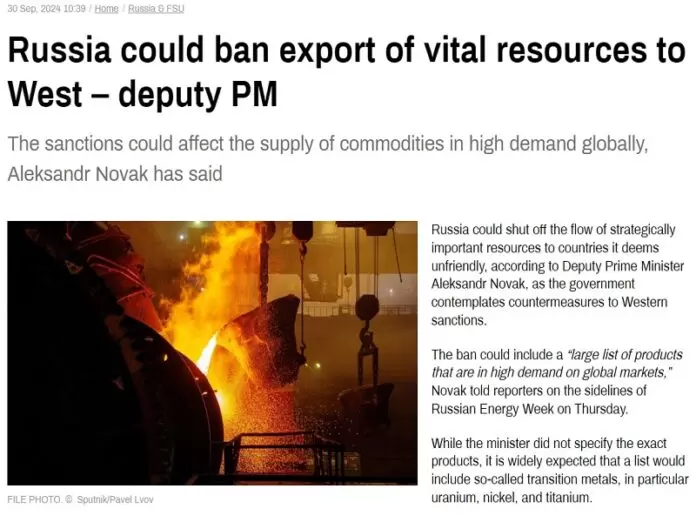RT cited Deputy Prime Minister Aleksandr Novak’s comments from last week’s Russian Energy Week event to report that “Russia could ban export of vital resources to West” like uranium, nickel, and titanium. He confirmed that this is being considered as a countermeasure to their sanctions and builds upon Putin’s proposal from mid-September. What’s holding Russia back from doing so right now, however, is that policymakers want to ensure that domestic industry wouldn’t suffer from less exports.
That’s a noble concern but it might be misplaced since Russia’s oil revenue already bounced back despite Western sanctions. China and India could purchase more critical minerals if there’s additional supply available and prices drop a bit just like they did with its oil. India could also serve as the middleman for facilitating Western purchases of these Russian resources just like it’s already helping them purchase the same oil that they sanctioned. Here are some background briefings for those who aren’t familiar:
* 16 January 2023: “The US Discredited Its Own Sanctions By Buying Refined Russian Oil Products Via India”
* 8 February 2023: “The West’s Anti-Russian Sanctions Made India Indispensable To The Global Energy Market”
* 28 December 2023: “India’s Russian Oil Imports Helped Prevent A Global Polycrisis”
The ramping up of Asian purchases coupled with India helping the West maintain their supply, which they cut off for semi-symbolic political reasons, helped stabilize this commodity’s price. The West paid a greater cost since India understandably charged a premium for its services, while Russia looked the other way since it was able to replace its lost revenue. India benefited from discounted prices, which fueled its rapid economic rise, while its middleman role solidified its neutrality in the New Cold War.
This precedent suggests that something similar will play out if Russia bans the export of critical minerals to the West. The oil arrangement works so well for all parties that there’s no reason why it wouldn’t be replicated in that scenario. Accordingly, not much is expected to change if this policy comes into place other than higher costs for the West, thus making it mostly symbolic just like the West’s own sanctions on Russian oil. Each side will probably spin it as a big deal, but the reality will likely be the opposite.








